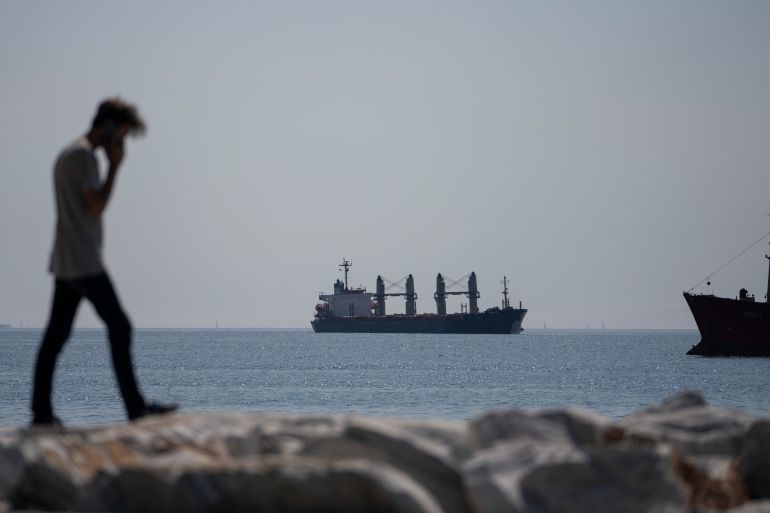Ukraine grain export deal extended for four months
UN chief Antonio Guterres, Turkey’s Erdogan welcome the continuation of the agreement days before it was set to expire.

A deal to allow vital grain exports to continue from Ukraine’s southern Black Sea ports has been extended for another four months, calming worries over the world’s food supply as inflation fears soar.
UN Secretary-General Antonio Guterres said on Thursday that the deal would continue for 120 days with Kyiv and Moscow’s approval. It was due to expire on Saturday.
Keep reading
list of 4 itemsAs Russia’s war in Ukraine drags on, Turkey’s role expands
Russia-Ukraine war: List of key events, day 267
Russia agrees to rejoin Ukraine grain export deal
“I welcome the agreement by all parties to continue the Black Sea grain initiative to facilitate the safe navigation of export of grain, foodstuffs and fertilisers from Ukraine,” Guterres said in a statement.
He said the UN was also “fully committed to removing the remaining obstacles to exporting food and fertilisers from the Russian Federation” – a part of the deal Moscow sees as critical.
#BlackSeaGrainInitiative will be prolonged for 120 days. 🇺🇦 @ZelenskyyUa together w/ @antonioguterres 🇺🇳@UN, 🇹🇷 @RTErdogan & Minister of Defence Hulusi Akar @tcsavunma made another important step in the global fight against the food crisis.
— Oleksandr Kubrakov (@OlKubrakov) November 17, 2022
Oleksandr Kubrakov, Ukraine’s infrastructure minister, hailed the extension as an “important step in the global fight against the food crisis”.
Maria Zakharova, Russia’s foreign ministry spokeswoman, said Moscow agreed to stick with the deal “without changes in terms or scope”.
Russia pulled out from the pact in late October, citing safety concerns after an attack on its Black Sea fleet, before rejoining days later.
Erdogan welcomes extension
The deal between the two warring sides, brokered in July by Turkey and the UN, has seen more than 11 million tonnes of agricultural products shipped from three of Ukraine’s Black Sea ports, including 4.5 million tonnes of corn and 3.2 million tonnes of wheat.
The extension was less than the one year sought by the UN and Ukraine.
But Turkish President Recep Tayyip Erdogan welcomed Russia and Ukraine’s consensus on continuing the deal.
“The significance and benefits of this agreement for the food supply and security of the world have become evident,” Erdogan tweeted.
In accordance with the resolution reached by Türkiye, the UN, the Russian Federation, and Ukraine, the Black Sea Grain Initiative was extended for an additional 120 days beginning November 19, 2022, as a result of the quadrilateral discussions hosted by Türkiye.
— Recep Tayyip Erdoğan (@RTErdogan) November 17, 2022
The three ports involved in the deal – Odesa, Chornomorsk and Pivdennyi – have the combined capacity to ship about three million tonnes a month.
Ukraine wanted to include the ports of the southern Mykolaiv region, which provided 35 percent of Ukrainian food exports before Russia’s invasion.
Russia previously said its approval to extend the deal depended on support for its grain and fertiliser exports. Russia is a major agricultural producer and the world’s largest wheat exporter.
Russia reportedly wants the West to ease restrictions on state agriculture lender Rosselkhozbank, a move that should help facilitate more of its exports.
The UN has assured Moscow that work will be done to remove barriers on Russian exports of agricultural products and fertilisers, Kremlin spokesman Dmitry Peskov said, without providing a specific timeline.
He added that Russia has seen progress towards easing sanctions, citing a joint statement by the United States, the United Kingdom and the European Union against measures on food and fertiliser exporters.